Central Marianas naval order of battle
On 15 June 1944, United States Marine and Army forces landed on the southwest coast of the island of Saipan in the central Marianas chain. US forces declared Saipan secure on 9 July.

Marine Corps forces landed on the nearby island of Tinian on 24 July. Tinian was declared secure 1 August.
The naval forces involved can be summarized as follows:
- Combat ships: 7 escort carriers, 7 old battleships, 6 heavy cruisers, 5 light cruisers, 69 destroyers, 28 destroyer escorts
- 150+ amphibious landing and support ships
- 85+ auxiliaries
Command structure
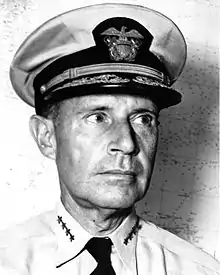

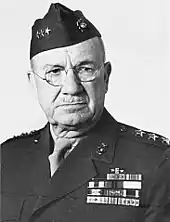

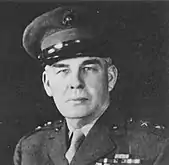

The roles of Commander in Chief, Pacific Ocean Areas (CINCPOA) and Commander in Chief, U.S. Pacific Fleet (CINCPAC), were both exercised by Admiral Chester W. Nimitz from his headquarters at Pearl Harbor, Hawaii.
Theater and Operational Command
Since the Marianas lie in the Central Pacific, their capture was the responsibility of the U.S. Fifth Fleet, led by Vice Admiral Raymond A. Spruance from aboard his flagship, heavy cruiser Indianapolis.
The ships and embarked troops of Operation Forager were under direct operational command of Rear Admiral Richmond Kelly Turner aboard amphibious command ship Rocky Mount.
The Marine and Army landing forces for Operation Forager were under the command of Maj. Gen. Holland M. "Howlin' Mad" Smith, USMC. Smith directed the ground troops from aboard Vice Adm. Turner's flagship Rocky Mount until the afternoon of 17 June when he set up his command post ashore.
Ground Troops
V Amphibious Corps (Maj. Gen. Holland M. Smith, USMC)
- Saipan: 2nd Marine Division (Maj. Gen. Thomas E. Watson)
- 4th Marine Division (Maj. Gen. Harry Schmidt)
- 27th Infantry Division (Army) (Maj. Gen. Ralph C. Smith)
- Tinian: 2nd Marine Division (Maj. Gen. Thomas E. Watson)
- 4th Marine Division (Maj. Gen. Harry Schmidt)
Forces afloat
_c1945.jpg.webp)
U.S. Fifth Fleet[1]
Admiral Raymond A. Spruance in heavy cruiser Indianapolis
Joint Expeditionary Force (Task Force 51)
Vice Admiral Richmond Kelly Turner in amphibious command ship Rocky Mount
- Northern Attack Force (Task Force 52 – Saipan and Tinian)
- Vice Admiral Turner
- Northern Attack Force (Task Force 52 – Saipan and Tinian)
- Southern Attack Force (Task Force 53 – Guam)
- Vice Admiral Richard L. Conolly in amphibious command ship Appalachian
- Southern Attack Force (Task Force 53 – Guam)
Carrier Support Group One (Task Group 52.14)
.jpg.webp)
_transporting_aircraft_on_17_January_1944_(NH_106573).jpg.webp)
Rear Adm. Gerald F. Bogan
- Unit 1 (Rear Adm. Bogan)
- 2 escort carriers
- Fanshaw Bay (Capt. D.P. Johnson)
- Composite Squadron 68 (Lt. Cmdr. R.S. Rogers):
- 16 FM-2 Wildcat fighters
- 12 TBM Avenger torpedo bombers
- Midway[lower-alpha 1] (Capt. F.J. McKenna)
- Composite Squadron 65 (Lt. Cmdr. R.M. Jones):
- 12 FM-2 Wildcat fighters
- 9 TBM Avenger torpedo bombers
- Fanshaw Bay (Capt. D.P. Johnson)
- 3 destroyers (all Fletcher-class): Cassin Young, Irwin, Ross
- 2 escort carriers
- Unit 2 (Capt. A.O. Weller)
- 2 escort carriers
- White Plains (Capt. Weller)
- Composite Squadron 4 (Lt. Cmdr. R.C. Evins (KIA)):
- 16 FM-2 Wildcat fighters
- 3 TBF, 9 TBM Avenger torpedo bombers
- Kalinin Bay (Capt. C.R. Brown)
- Composite Squadron 3 (Lt. Cmdr. W.H. Keighley):
- 14 FM-2 Wildcat fighters
- 9 TBM Avenger torpedo bombers
- White Plains (Capt. Weller)
- 3 destroyers (all Fletcher-class): Porterfield, Callaghan, Longshaw
- 2 escort carriers
Carrier Support Group Two (Task Group 52.11)


Rear Adm. H.B. Sallada
- Unit 3 (Rear Adm. Sallada)
- 2 escort carriers
- Kitkun Bay (Capt. J.P. Whitney)
- Composite Squadron 5 (Cmdr. R.L. Fowler):
- 12 FM-2 Wildcat fighters
- 8 TBM Avenger torpedo bombers
- Gambier Bay (Capt. H.H. Goodwin)
- Composite Squadron 10 (Lt. Cmdr. E.J. Huxtable):
- 16 FM-2 Wildcat fighters
- 12 TBM Avenger torpedo bombers
- Kitkun Bay (Capt. J.P. Whitney)
- 3 destroyers (all Fletcher-class): Laws, Morrison, Benham
- 2 escort carriers
- Unit 4 (Rear Adm. Felix B. Stump)
- 1 escort carrier
- Nehenta Bay (Capt. H.B. Butterfield)
- Composite Squadron 11 (Lt. Cmdr. O.B. Stanley):
- 12 FM-2 Wildcat fighters
- 9 TBM Avenger torpedo bombers
- Nehenta Bay (Capt. H.B. Butterfield)
- 3 destroyers (all Fletcher-class): Bullard, Kidd, Chauncey
- 1 escort carrier
Fire Support Group One (Task Group 52.17)
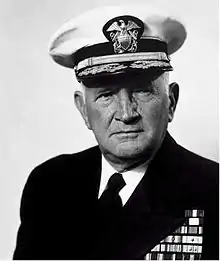

Rear Adm. Jesse B. Oldendorf
- Unit 1 (Rear Admiral Howard F. Kingman):
- 2 old battleships: Tennessee (Capt. A.D. Mayer), California (Capt. H.P. Burnett)
- 1 heavy cruiser: Indianapolis (Capt. E.R. Johnson)
- 1 light cruiser: Birmingham (Capt. T.B. Inglis)
- 4 destroyers (all Fletcher-class): Remey, Wadleigh, Norman Scott, Mertz
- Unit 2 (Cmdr. P.H. Fitzgerald):
- 3 destroyers (2 Fletcher-class): Robinson, Albert W. Grant, (1 Benson-class): Bailey
- Unit 3 (Capt. H.P. Jarrett):
- 3 destroyers (2 Fletcher-class): Halsey Powell, Monssen, (1 Benson-class): Coghlan
- Unit 4 (Rear Adm. Oldendorf):
- Unit 5 (Rear Adm. R.W. Hayler):
- 2 light cruisers: Montpelier (Capt. H.D. Hoffman), Cleveland (Capt. A.G. Shepard)
- 3 destroyers (all Fletcher-class): Yarnall, Twining, Stockham
Fire Support Group Two (Task Group 52.10)

_firing_broadside_c1944.png.webp)
Rear Adm. Walden L. Ainsworth
- Unit 6 (Rear Adm. Ainsworth)
- 2 old battleships: Pennsylvania (Capt. C.F. Martin), Idaho (Capt. H.D. Clarke)
- 1 light cruiser: Honolulu (Capt. H.R. Thurber)
- 3 destroyers (all Fletcher-class): Anthony, Wadsworth, Hudson
- 1 high-speed transport: Dickerson
- 1 high-speed minesweeper: Hogan
- 1 seaplane tender: Williamson
- Unit 7 (Rear Adm. George L. Weyler)
- 1 old battleship: New Mexico (Capt. E.M. Zacharias)
- 2 heavy cruisers: Minneapolis (Capt. Harry Slocum), San Francisco (Capt. H.E. Overesch)
- 3 destroyers (all Fletcher-class): Halford, Terry, Braine
- 1 high-speed transport: Talbot
- 1 high-speed minesweeper: Stansbury
- Unit 8 (Rear Adm. C. Turner Joy)
- 2 heavy cruisers: Wichita (Capt. J.J. Mahoney), New Orleans (Capt. J.E. Hurff)
- 1 light cruiser: St. Louis (Capt. R.H. Roberts)
- 3 destroyers (all Fletcher-class): Fullam, Guest, Bennett
Control Group (Task Group 52.6)
Commodore P.S. Theiss
Transport Group "Able" (Task Group 52.3)
Capt. H.B. Knowles
Embarking ![]()
- Transport Division 18 (Capt. Knowles)
- Transport Division 10 (Capt. G.D. Morrison)
- Transport Division 28 (Capt. H.C. Flanagan)
- 3 attack transports: Bolivar, Doyen, Sheridan
- 1 transport: Comet
- 1 attack cargo ship: Electra
- 1 landing ship dock: Oak Hill
Transport Group "Baker" (Task Group 52.4)
Capt. D.W. Loomis
Embarking ![]()
- Transport Division 20 (Capt. Loomis)
- 3 attack transports: Leonard Wood, Pierce, James O'Hara
- 1 transport: La Salle
- 1 attack cargo ship: Thuban
- 1 landing ship dock: Ashland
- Transport Division 26 (Capt. R.E. Hanson)
- Transport Division 30 (Capt. C.A. Misson)
- 3 attack transports: Knox, Calvert, Fuller
- 2 transports: John Land, George F. Elliot
- 1 attack cargo ship: Bellatrix
Eastern Landing Group (Task Group 52.8)
Cmdr. C.J. McWhinnie
Embarking 1st Battalion, 2nd Marines[lower-alpha 2]
- Transport Division 12 (Cmdr. McWhinnie)
Transport Screen (Task Group 52.12)
Capt. R.E. Libby
- 15 destroyers:
- 7 Fletcher-class: Newcomb, Bennion, Heywood L. Edwards, Bryant, Prichett, Cony, Renshaw
- 2 Porter-class: Phelps, Selfridge
- 1 Mahan-class: Conyngham
- 2 Bagley-class: Bagley, Patterson
- 1 Sampson-class: Shaw
- 2 Wickes-class: Philip, Mugford
- 1 high-speed transport: Kane
- 4 patrol craft escorts: 1396, 1404, 1457, 1460
Tractor Flotilla (Task Group 52.5)
Capt. A.J. Robertson
- Tractor Group "Able" (Capt. J.S. Lillard)
- Unit 1: 8 landing ship tanks
- Unit 2: 8 landing ship tanks
- "Able" Reserve: 6 landing ship tanks
- Tractor Group "Baker" (Capt. Robertson)
- Unit 3: 8 landing ship tanks
- Unit 4: 8 landing ship tanks
- "Baker" Reserve: 4 landing ship tanks
- Support Artillery Group: 7 landing ship tanks
Minesweeeping and Hydrographic Survey Group (Task Group 52.13)
Cmdr. R.S. Moore, USNR
- Unit 1 (Cmdr. W.R. Loud)
- Unit 2 (Lt. Cmdr. H.L. Thompson)
- Unit 3 (Cmdr. Moore)
- 3 minesweepers (all Auk-class): Chief, Champion, Herald
- 3 minesweepers (all Auk-class): Chief, Champion, Herald
- Unit 4 (Lt. Cmdr. J.R. Fels, USNR)
- 3 minesweepers (all Auk-class): Oracle, Motive, Heed
- 3 minesweepers (all Auk-class): Oracle, Motive, Heed
- Units 5 & 6 and Mobile Hydrographic Unit
Joint Expeditionary Force Reserve (Task Group 51.1)
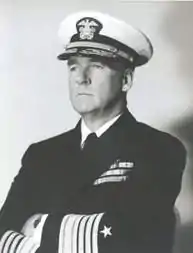
Rear Adm. William H.P. Blandy
Embarking ![]()
- Transport Division 7 (Capt. C.G. Richardson)
- Transport Division 32 (Capt. M.O. Carlson)
- 3 attack transports: Fremont, Harris, Custer
- 1 transport: Herald of the Morning
- 1 cargo ship: Auriga
- 4 destroyers (all Fletcher-class): Waller, Pringle, Saufley, Sigourney
- 2 destroyer escorts (both Evarts-class): Sederstrom, Fleming
- 1 fleet tug: Chickasaw
- Transport Division 34 (Capt. Charles Allen)
- 4 transports: Prince Georges, Kenmore, De Grasse, Livingston
- 1 cargo ship: Leonis
- 7 landing craft infantry
- Screen (Cmdr. J.R. Phal)
- 2 destroyers (both Fletcher-class): Conway, Eaton
- 4 destroyer escorts (2 Evarts-class): Tisdale, Eisele, (2 Cannon-class) Baron, Acree
- 1 net layer: Mimosa
- 1 net cargo ship: Keokuk
Service and Salvage Group (Task Group 52.7)
Capt. S.E. Peck
- 1 net layers: Cinchona
- 3 fleet tugs: Tekesta, Tawasa, Molala
- 1 repair ship: Phaon
- 2 salvage vessels: Preserver, Clamp
- 1 seaplane tender: Ballard
- 1 landing craft repair ship: Agenor
- 8 auxiliary motor minesweepers
Fueling Group (Task Group 50.17)
Capt. Edward E. Paré
- 24 fleet oilers: Neshanic, Saugatuck, Saranac, Lackawanna, Monongahela, Neosho, Cimarron, Kaskaskia, Sabine, Caliente, Guadalupe, Platte, Pecos, Schuylkill, Tallulah, Ashtabula, Cahaba, Tappahannock, Kennebago, Marias, Suamico, Cache, Kankakee, Mascoma
- 8 destroyers (all Fletcher-class): Paul Hamilton, Capps, John D. Henley, Hall, Evans, David W. Taylor, Halligan, Haraden
- 14 destroyer escorts
- 9 Cannon-class: Samuel S. Miles, Swearer, Bangust, Weaver, Riddle, Waterman, Lamons, Wesson, Hilbert
- 5 Evarts-class: Fair, Manlove, Mitchell, Whitman, Wileman
- 4 escort carriers:[lower-alpha 3] Copahee, Breton, Manila Bay, Natoma Bay
- 4 hospital ships: Relief, Solace, Bountiful, Samaritan
Notes
- Renamed St. Lo 10 October 1944, sunk during the Battle off Samar 20 October
- This unit was originally meant to make a diversionary landing on Saipan's east coast, but this part of the operation was cancelled.
- Carried replacement aircraft for frontline carriers
References
- Rottman, p. 35
Bibliography
- Morison, Samuel Eliot (1953). New Guinea and the Marianas, March 1944 – August 1944. History of United States Naval Operations in World War II. VIII. Boston: Little, Brown and Co. LCCN 53-7298.
- Rottman, Gordon (2004). Saipan & Tinian 1944: Piercing the Japanese Empire. Osprey Publishing. ISBN 1-84176-804-9.